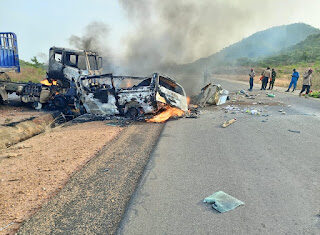Dele Charley’s The Blood of a Stranger (a play) brings a succinct overview of the rape of Africa by colonialists. It was first performed in Lagos, Nigeria at the Festival of African Arts and Culture (FESTAC 77). And it won best play.
Raymond Dele Charley exposes the problems of Africa through the eyes of an observer and a thinker with the hindsight of an educated man making his native Sierra Leone a case study.
Sierra Leone has diamond. In this play, the people of the land are so ignorant that they don’t know what they have. In fact, when the word diamond comes up for the first time in the play, the highly corrupt right hand man of the king, the king’s adviser says to the white man, ‘I have heard about them,’ to the white man’s question of, ‘Have you ever heard of Diamonds?’
The Blood of a Stranger is a simple play that portrays in an easy to understand English, how unscrupulous white men craftily invaded African countries with gifts of intoxicating alcoholic drinks, drugs and negligible cash to ravish the land. However, they do not work alone. They engage the help of corrupt Africans in positions of authority to rape the land.
In this play, a representative of colonialists called Whitehead, with the help of the king’s chief adviser, Maligu, enters an African community with intent to mine diamonds. With money, alcohol and tobacco laced with addictive hard drug, he buys Maligu, Soko, the priest and others below them.
Maligu who is learned and works closely with the king, says he has received a letter from his brother in the city telling him of the visit of a white man. Knowing that the village will not accept this intruder having been previously warned, he engages the corrupt priest. Maligu tells him to prophesy to the people that the gods have spoken that a stranger is coming to the village and they should receive him for the peace of the land.
Despite the strangeness of this prophecy, the people and their king instantly believe in the words from the priest’s mouth without question.
Only one person out of the whole community is thoughtful enough to question why the gods should send a stranger when they (the gods) had said no stranger should be allowed into the village. This is Kindo, the king’s son, a warrior and a kind of Chief of Defence. As chief security officer, nothing escapes Kindo’s eye. He knows most things going on in the village, e.g., that the priest doesn’t sleep in the shrine, that he has a comfortable hut in the forest where he retires to at midnight while deceiving the people that he doesn’t sleep, that he communes with the gods all night. Kindo knows that the priest is as corrupt as his father’s aide, the king’s chief adviser, Maligu. And he knows that the frog doesn’t do the afternoon race for nothing, that for a white man to appear in his village, it is not for tobacco.
The white man on the other hand intends to bribe his way through, using cash, drug laced tobacco and alcohol to achieve his aim which is taking the village’s diamonds.
It is also worthy of note that the white man arrives in the village with another African. This shows that it is Africans who sell themselves. Then Maligu, the king’s aide is the rat at home who brings in the rat outside.
Greed and ignorance are flaws that made Africans sell themselves cheap to the colonialists.
Writing from a knowledgeable hindsight, Dele Charley humiliates the white man as he arrives their village. He tells him to kiss the ground for the king because in his land, they bow to their queen. The playwright also punishes the African who brings the white man to the village for knowing the custom of his people, but choosing to break it for the white man.
The white man calls Kindo a ‘savage’ for flogging Parker, the black man who brought him to the village. This is a colonial term used by colonialists to take away authority from Africans. The whites know how to behave, the black man doesn’t, so he should be put down and ruled over. Only in this case, it does not work out. Kindo’s spirit is stronger and he’s sober and not deceived.
Kindo would have thwarted the white man’s plan but, for the craftiness of Maligu and Whitehead who say Kindo has broken the custom, that he sheds the innocent blood of Parker in the time of peace and has to be banished. The king sides tradition. Although Kindo is his son, he must be banished for breaking custom lest he brings evil upon the land.
How much Africa is enslaved by their belief in their local deities is seen in how the people submit to the will of the gods according to the prophecy of Soko, the priest. It can also be seen in how the king mutters, ‘It is what the spirits have willed.’ He cannot question the will of the spirits even though he never hears them say anything. He depends on the priest, Soko, a corrupt man, who desires the good things of life while pretending to live an austere life, to tell him and his people what the spirits are saying.
This play exposes the sad regrettable state of Africans. It echoes Fela Ransome Kuti’s song titled, Zombie, especially the line where he sings, ‘My brother mek you no follow book o, read am and use your sense!!!’ Many African leaders did not use their senses when the colonialists invaded Africa.
African ancestors did not use their senses. They were too engrossed in unseen spirits and demons. They would rather make a sacrifice to a mountain instead of climbing over to see what’s on the other side. They did not explore their lands and water to see what benefits they offered or how they could subdue them, they chanted into the atmosphere invoking spirits perceived and selling their intellects to unseen beings.
The treatment of the village priest in the play as a cheat and a corrupt fellow demystify Africans’ belief in local deities and their reverence to their priests. In fact, Dele Charley’s treatment of the people’s belief in their local deities and their priests shows that the playwright believes that this is a major stumbling block to Africans. Charley limns the villagers as having a blind trust in the community deities and the priests rather than using their senses to think matters through before taking decisions. The playwright portrays the people of this African community which is a representation of Africans, as having more faith in what the priest says rather than the people engaging in careful thoughts about what would make a white man leave his land, choosing to live in their village to plant tobacco. Is it that tobacco doesn’t do well in the white man’s land? Of what benefit would the white man’s tobacco be to this African community? Should we let him come? What conditions should we give him to live in our land, if any? But because the priest of their local deity has spoken, both the king and the people of the land agree.
Dele Charley shows us how greed and avarice can so corrupt a man and make him vulnerable to exploitation as in the cases of Maligu and Soko.
In the issue of Kindo, the playwright paints a picture of how upright people can suffer wrongly. Kindo who has a heart for the people of the land, suffers banishment because of the blindness or ignorance of the ruler and corrupt personalities at the top. Those at the top, because they have voice and influence, stifle justice and progress for their personal gain. Charley paints the picture of a disciplined and upright man in Kindo. He’s the chief security officer in the land and knows he needs to be sober. So Kindo doesn’t smoke, doesn’t drink and does not indulge in immorality.
Although the closing seems dismal, Charley forgets not to leave a ray of hope. He shows that some justice is immediate as Soko dies, Parker dies and finally, Whitehead dies. But, some judgement comes late; sentence against evil can creep slowly as where Maligu is. He does not die. However, the king, the ignorant and easily deceived ruler is still alive, but old and according to Kindo, has not many years to live. So, Kindo promises to return at the death of the king to reclaim the land and free the people from the hands of people like Maligu.
Africa today awaits the return of many Kindos – men and women who are disciplined and sober, who have a heart for the people of the land, whose interest in politics is not for personal aggrandisement but for the goodness of Africa and her people. And what will get us there is the blood of the stranger. All strange children must be killed, not only strangers! The Bible talks about strange children – king David says in Psalm 144: 11, “O, Lord, rid me of strange children!” Strange children are ‘vision helpers who become treacherous.’ Strange children do not have the goodness of the land at heart. Strange children think selves first!
This play is so well written that there’s no scene, sentence or word that needs to be cut off.
The Blood of a Stranger by Dele Charley makes the WAEC list for Literature books for 2016-2020.
Although the playwright is no more, his work lives on.
ATTENTION: please, if you have wards/children who have chosen Literature as a subject in WAEC/GCE/NECO, introduce them to this column. It will be of help to them. Also, all Literature/Literary Studies students and all writers, should visit this column weekly.
Contributions and literary criticisms are welcome.













